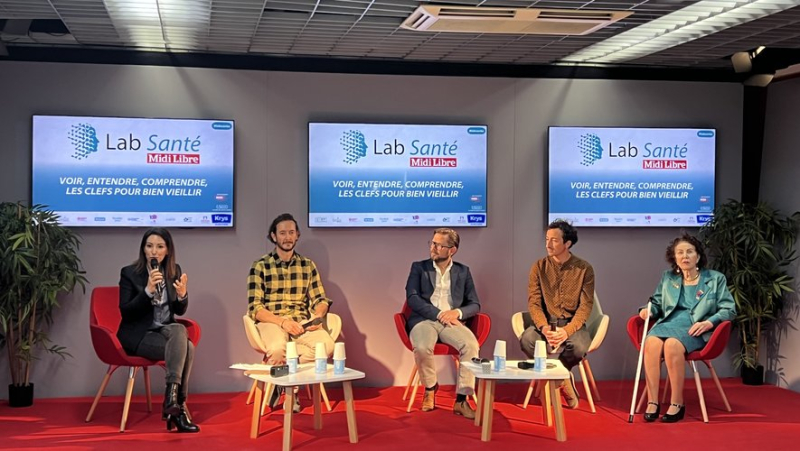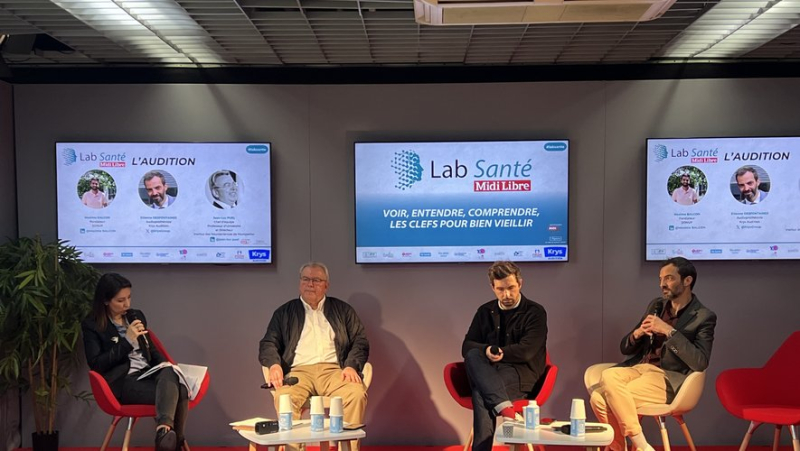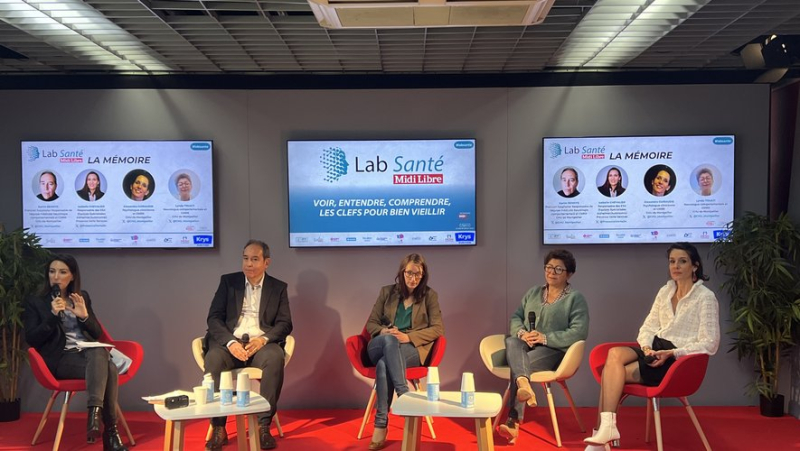See, hear, remember: the keys to aging well in debate at the Midi Libre Health Lab

Gaël Manes, doctors Luc Jeanjean and Julien Plat and Monique Roux participated in the round table on vision. Free Midday

Jean-Luc Puel, Maxime Balcon and Etienne Desfontaines for the round story dedicated to the hearing. Free Midday

Karim Bennys, Isabelle Chevalier, Lynda Touati et A. Guiraudie pour la table ronde sur la mémoire et ses troubles Midi Libre
Midi Libre devoted a morning to the issues of vision, hearing and memory, during its Health Lab on March 12. In three round tables, the specialists explained the main pathologies, treatments and outlined the state of research.
The vision: " Cutting-edge research and great prospects"
80% of our information comes through sight. Doctor Julien Plat, ophthalmologist at Montpellier University Hospital, explained with great simplicity the characteristics of presbyopia, glaucoma, cataracts and AMD: "Many of these pathologies are linked to the aging of ocular tissues and are unavoidable. From the age of 40, an appointment every two years with your ophthalmologist is necessary to detect them."
Low vision rehabilitation
From wearing glasses or contact lenses to eye drops, laser, implant placement or surgical interventions, many solutions exist. When there is no more, we turn to low vision rehabilitation, as practiced at the Aramav clinic, in Nîmes, by Luc Jeanjean, head of the neuro-ophthalmology department. "We are a reference center in France, he explains, for tailor-made rehabilitation. The idea being to allow the brain to use its full potential, with the vision that patients have left, to adapt. We use rehabilitation, virtual and augmented reality, simulation of low vision and we support the patient in order to provide them with solutions, whatever the stage of their illness."
Retinitis pigmentosa
Among vision pathologies, retinitis pigmentosa is a rare degenerative disease, which leads to total loss of vision. The testimony of Monique Roux, president of SOS Rétinite, affected since the age of 32, was particularly moving. At over 80 years old, she continues to carry out awareness-raising activities and has been participating in funding research for the fight of her life for forty years. An exceptional woman who Gaël Manes knows well, researcher at the Montpellier Neuroscience Institute, who devotes his work to this disease : "Two responsible genes have been identified to date, out of a hundred, and only one gene therapy exists. But research here, in Montpellier, is at the cutting edge and this opens up great prospects."
Hearing: one in four adults affected by some form of hearing loss
In France, one in four adults is affected by some form of hearing loss. During this round table devoted to hearing, Professor Jean-Luc Puel, director of the Audio Campus and a leading hearing specialist, drew up an alarming observation.«"One in two people over the age of 65 have hearing loss. And when we see the way young people work with headphones, it will be a real disaster when they are 40."
From this age, our hearing ages. Insidiously, at first, until the frequencies of language prevent us from understanding and following conversations and end up isolating us socially. When the hearing capital is damaged, the only solution is hearing aids.
Étienne Desfontaines is a hearing aid specialist Krys Audition: "The patient profile has evolved, because there is awareness of this discomfort and more and more frequent screenings are carried out. Even if there is a reluctance to have the device, the technical and aesthetic progress of the devices and the implementation of 100% health care have allowed everyone to access them."
Supported and efficient devices
But to be fitted, the problem must still be identified. To do this, you must carry out a test by going to your ENT, but you can also have access to self-tests. Maxime Balcon is one of the founders of the Montpellier start-up Sonup." We develop applications for screening and diagnosis of hearing disorders, including in noise , he explains, so that the patient can carry out an initial test and judge the relevance of entering the care pathway. The patient is tested by going to an equipped pharmacist or to an optician or even a hearing aid specialist."
Memory. Alzheimer's: "Care as early as possible"
From benign forgetfulness to neurodegenerative pathologies, there are numerous diseases leading to memory impairment.
Alexandra Guiraudie psychologist specializing in neuropsychology at the Memory Center of Montpellier University Hospital, a reference center in the diagnosis of Alzheimer's disease and related pathologies and research center, recalled that memory "is an intellectual capacity to record, store and be able to restore memories. We build up a brain reserve over time. To preserve your memory and build a rich cognitive reserve, it is important to stimulate it through numerous activities, learning and emotions. If in doubt, do not hesitate to take tests as we do."
Towards a treatment
Doctor Karim Bennys, is a doctor, neuro-geriatrician responsible for the Memory Center:"Alzheimer’s disease is scary. But in thirty years, we have made considerable progress in understanding the early phases of the disease. Today, thanks to research, we can identify toxic markers even before symptoms, thanks to a lumbar puncture and tomorrow, perhaps, with a simple blood test. This allows for the earliest possible treatment. The new thing is targeted therapies, which make it possible to slow down the trajectory of the disease over eighteen months. A future treatment will make it possible to eliminate 100% of the toxic protein and therefore stop the disease. This is extraordinary in twenty-five years of research."
Supported
For the management of Alzheimer's disease, different solutions exist. The specialized autonomy and Alzheimer's teams work at home for patients with cognitive disorders. "We work on light to moderate stages, explains Isabelle Chevallier, head of ESA at Présence verte. The patient expresses needs and objectives and we help him to implement strategies over several months." There is also inpatient care day care (HDJ) or in permanent reception, such as at the Jardins de Sophia, a clinic specializing in welcoming Alzheimer's patients.
Doctor Lynda Touati is a neurologist in the establishment, she insists on the importance of this day hospitalization: "We offer half-day activities, for improve cognitive abilities, affect, act on depression, motor activities. These are non-drug therapies, which have proven themselves and are prescribed today."




